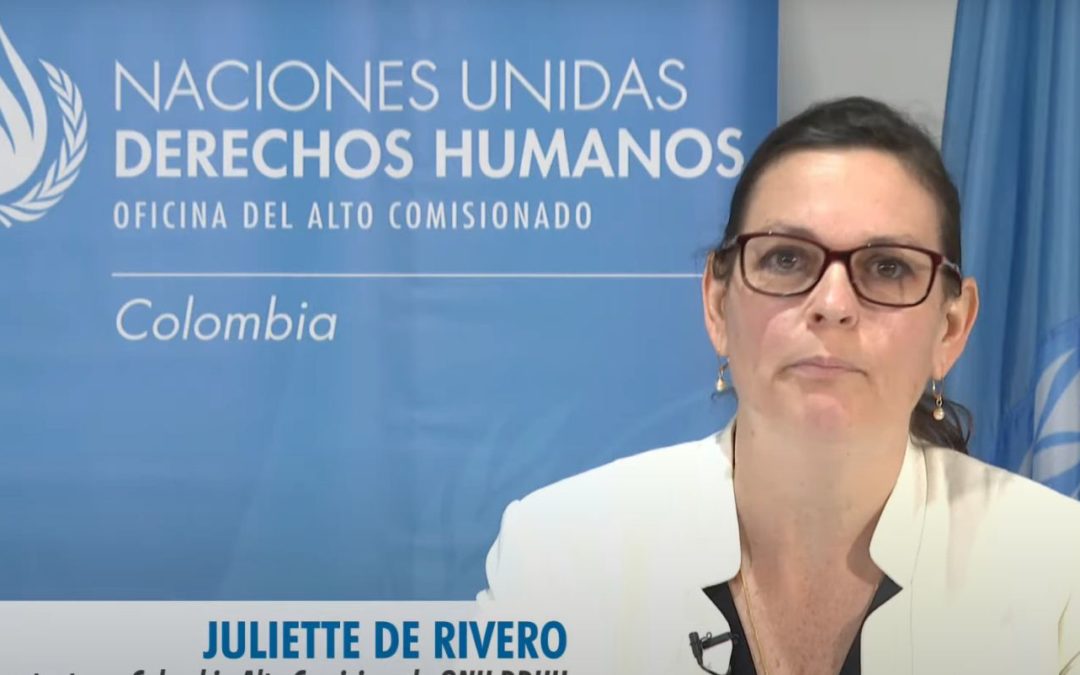Expressed in the Annual Report of the United Nations High Commissioner for Human Rights on Colombia, 2021
On March 3, 2022, Juliette de Rivero, representative of the Office of the United Nations High Commissioner for Human Rights (OHCHR) in Colombia, presented the annual report on the human rights situation during the period from January 1 to December 31, 2021.
In the year of the fifth anniversary of the signing of the peace agreement, the report emphasizes the enjoyment of economic, social and cultural rights, the prevention of violations, the protection of human rights, access to justice and the fight against impunity. The High Commissioner also presented recommendations to help improve the human rights situation in the country.
Relive here the presentation of the report
The OHCHR highlights three results and advances 5 years after the peace agreement signed between the Colombian State and the FARC-EP: the establishment of a new political agreement, the creation of 16 Special Transitory Peace Circumscriptions, and the positive balance of transitional justice. In addition, there was an 8.7% increase in GDP compared to the same period in 2020 and a 2.4 percentage point drop in the unemployment rate.
However, the year 2021 also marks a significant increase in violence in rural areas and some urban centers, particularly against indigenous communities, Afro-descendants, peasants, and women. The pandemic worsened the already existing violence and social and economic inequalities, as well as the problems of access to education due to the cessation of all face-to-face activities. According to the Economic Commission for Latin America and the Caribbean, Colombia is the country with the second highest level of inequality in the region.
The Office of the High Commissioner also expresses its concern regarding the right to life and the numerous gender-based violence, particularly against women and girls. In fact, the Attorney General’s Office received 43,394 complaints at the end of 2021, of which 86% of the victims were women, and 183 complaints of femicides.
Regarding violence in rural areas, de Rivero indicated that the situation has worsened and that the levels of homicidal violence were mostly concentrated in four departments of the country – Antioquia, Nariño, Cauca and Valle del Cauca – which were also highly affected by the armed conflict at the time. “In total there were 100 cases of possible massacres, of which 78 were verified (…). These events were also accompanied by limitations on ancestral and community practices, and other harassment by illegal armed groups,” said De Rivero.
The representative indicated the high risk of violence in the 16 CTEPs, in the context of the upcoming elections when 16 victims will vote for seats in the House of Representatives. In this regard, she points out the presence of non-state armed groups and criminal organizations operating in these areas that could disrupt the electoral process. The Office “calls on the State to take preventive measures to guarantee the exercise of electoral activities and political participation in an environment free of threats and all types of violence.”
The OHCHR finally recalls the recommendations made in previous reports, and calls on the State to urgently address the situation in the territories most affected by violence, reinforcing the presence of civilian authorities, in particular the Public Prosecutor’s Office, including municipal offices, and the provision of basic services to prevent and contain violence and protect the civilian population and community, social, indigenous and Afro-descendant leaders in these areas. It also urges the State to redouble its efforts to implement the Peace Agreement, in particular the Comprehensive Rural Reform, the Development Programs with a Territorial Approach, PDET, and the ethnic chapter, in order to combat structural inequalities.
In conclusion, the Office notes that, although some results of the peace process can be observed five years later, the human rights situation remains critical and of great concern. The Colombian State must follow the recommendations of the High Commissioner to ensure that the tragedies of the past are never repeated, to overcome economic and social inequalities, to put an end to impunity and to finally move towards the social rule of law.
See all OHCHR observations and recommendations in the official document:
A_HRC_43_3_Add.3_AdvanceUneditedVersion03-03-2022-final-infografias-7-am

